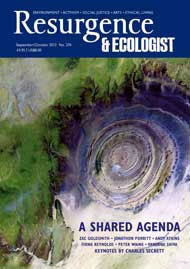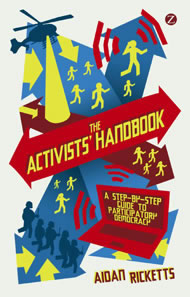It astounds me how NGOs and environmental activists are so often one step ahead of the game: whether it’s campaigning against BP’s sponsorship of the arts or for more rigorous checks on so-called biofuels, it is activists who are challenging the political and economic systems that are no longer fit for purpose. They are the nemesis of the corporate world, the freedom fighters brave enough to put their bodies in the path of the industrial maw.
But how do they do it? And could you do it too?
Written by a seasoned activist – and one who believes that one day you are quite likely to wake up and find an issue on your own doorstep that you just can’t ignore – this book is a step-by-step guide to help you stand up for your principles using a variety of different strategies. From direct action to strategic litigation and conflict resolution, the author sets out the tools at your disposal and the different likely legal consequences.
The main thrust of the book is that activism is in fact the practice of participatory democracy and that whilst being an agent of social change can be one of the most rewarding journeys in life, it is important to be aware of the significant skills and awareness needed to avoid pitfalls and burnout.
Whilst democracy is an idea grounded in the premise that political power is derived from the will or at least the consent of the people, this is not always the case, so the practice of participatory democracy – or activism – requires each citizen to take an active role in the affairs of the community and nation, and to be prepared to make their concerns heard and felt. Individual activists can achieve a lot, but by far the most effective way to bring about social change is through organised groups or social movements.
Social movements are immensely powerful political forces because they harness the collective will and agency of the masses – indeed, it is interesting to stop and consider some of the more successful social movements, whose work we now take for granted: the suffrage movement, the anti-slavery movement, the movement to end child labour, the anti-apartheid movement.
In his toolbox for addressing social inequality, Aidan Ricketts includes ethical investing, ethical consumerism, consumer boycotts and shareholder activism – a sign of our times that much activism these days is aimed at businesses and corporations whose actions are detrimental to communities and the wider environment. The “feedback loop of effective corporate campaigning” draws the corporations into the debate because they are made to address the continued reputational damage the campaign creates. The best way for the company to address this is to accede to the agenda of the social movement. It can take a very long time, but the McLibel campaigners are probably chuckling to themselves even now as McDonald’s UK makes its own biofuel from waste cooking oil. Corporate activism therefore represents an increasingly important focus for participatory democracy.
One of the more traditional forms of activism, and one that the author acknowledges as most effective – because it engages the “theatre of protest” – is direct action, including blockades, marches, protests and interventions. Risky as they can be because they often break the law, these forms of raising awareness are often colourful, carnival-like events that provide good media copy and images.
The newest form of participatory democracy is digital activism, which has recently come under fire from seasoned campaigners as no more than ‘clicktivism’ – but Ricketts argues that coupled with the other tools at our disposal digital activism such as that slickly practised by avaaz.org and 350.org plays an increasingly important role.
In the UK a petition of 100,000 signatures about a particular concern means the government must debate the issue in parliament. This has led to the cancellation of some risible policies such as the proposal to sell off the national forests. Worryingly, the other side of digital activism is that it is much easier for governments to track organisations and groups that are engaging in a given campaign. We’ve recently seen moves for governments to ‘spy’ on internet communication, ostensibly in the name of anti-terrorism, but in truth it is to keep tabs on the rise of digital activism.
Being an activist can be an excellent antidote to feelings of powerlessness and meaninglessness in life – it is about overcoming passivity, self-doubt and resignation and unleashing empowerment. Activism has the capacity to create change in the world and also engenders a deeply personal transformation, because when a person takes a stand on an issue, they are transformed, and often it is a spiritual experience, too. Social movements are the most effective response to correct malign social problems and policies and it is important to keep believing in their power. “The greatest challenge of our time can also be our greatest joy – to join together in the healing of our world.”
The Activist’s Handbook is available for sale from Zed Books www.zedbooks.co.uk at a price of £14.99








